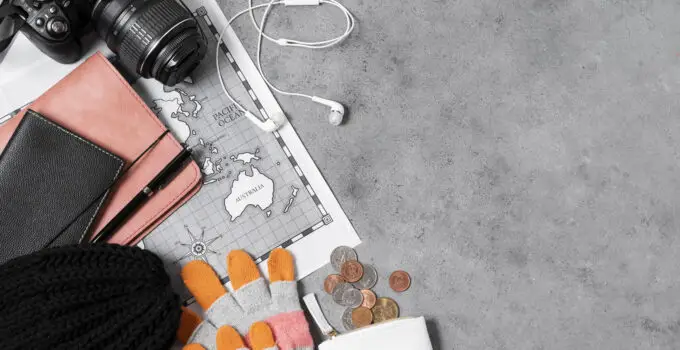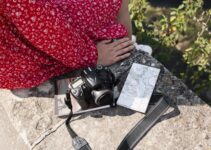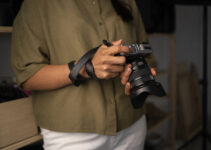Ever wondered how to make a camera bag at home? With a few materials and some creativity, you can create a custom bag that fits your camera perfectly.
Are you ready to dive into this DIY project?
Creating a camera bag at home is easier than you think.
Gather your materials, follow a few simple steps, and you’ll have a sturdy, stylish camera bag. This guide will walk you through the entire process from start to finish.
Excited to get started? Let’s explore how you can make your own camera bag with ease. Grab your tools, and let’s jump into this hands-on project!
Here is camera bag allowed in cabin baggage.
Can you make a camera bag at home?
Yes, you can make a camera bag at home with some basic materials and sewing skills.
Start with a sturdy fabric like canvas or denim for the exterior and a soft, padded material for the interior to protect your camera.
- Cut the Fabric: Measure and cut the exterior and interior fabrics. You’ll need two large rectangles for the front and back, and two smaller rectangles for the sides.
- Sew the Pieces: Stitch the exterior pieces together, then do the same for the interior pieces. Leave the top open.
- Add Padding: Insert foam or batting between the exterior and interior layers for extra protection.
- Create Compartments: Use smaller fabric pieces to sew customizable dividers inside the bag.
- Add a Closure: Attach a zipper or Velcro to the top for secure closure.
- Strap: Sew on a strong, adjustable strap for easy carrying.
This homemade camera bag will be both functional and personalized.
Are camera bag easy to make at home?
Making a camera bag at home can be moderately challenging, depending on your sewing skills and the complexity of the design.
Basic sewing skills are essential, as you’ll need to measure, cut, and stitch various pieces of fabric.
Start with sturdy materials like canvas or denim for the exterior and padded, soft materials for the interior to protect your camera.
The process involves creating compartments and dividers to securely hold your camera and accessories, which requires precise measurements and careful sewing.
If you follow a simple design and take your time, making a camera bag can be a rewarding DIY project.
For those with advanced sewing skills, adding features like adjustable straps, pockets, and zippers can enhance the bag’s functionality.
Here, how to make a homemade waterproof camera bag?
While it may not be as easy as making a basic tote bag, with patience and attention to detail, you can create a customized and durable camera bag.
Why you want to make camera bag at home?
Making a camera bag at home offers several advantages.
Firstly, it allows for full customization. You can tailor the bag to fit your specific camera model and accessories, ensuring that everything has its place and is well-protected.
This personalization extends to the choice of materials, colors, and design, allowing you to create a bag that reflects your style and meets your needs precisely.

Secondly, making your own camera bag can be cost-effective.
High-quality camera bags can be expensive, but by sourcing your own materials and using DIY methods, you can save money while still achieving a durable and functional product.
Additionally, the process of making a camera bag can be rewarding and fulfilling.
It’s an opportunity to develop your sewing and crafting skills, and the satisfaction of using something you made yourself adds a unique value.
Overall, making a camera bag at home combines practicality, creativity, and cost savings.
Things to know before making a camera bag at home
Before making a camera bag at home, consider the following key factors:
- Material Selection: Choose durable, water-resistant fabrics for the exterior, like canvas or nylon, and soft, padded materials like foam or batting for the interior to protect your camera gear.
- Design and Dimensions: Plan the bag’s design carefully. Measure your camera and accessories to determine the dimensions and layout. Include compartments and dividers for organization and protection.
- Sewing Skills: Basic to intermediate sewing skills are necessary. Familiarize yourself with sewing techniques for heavy fabrics and padding.
- Tools and Supplies: Gather all necessary tools, such as a sewing machine, scissors, measuring tape, and strong thread. Zippers, Velcro, and adjustable straps are essential for functionality.
- Pattern and Instructions: Use a pattern or tutorial to guide your project. This helps ensure accuracy and efficiency.
- Time and Patience: Making a camera bag is time-consuming and requires attention to detail. Allocate enough time and work patiently to achieve a high-quality result.
Understanding these factors will help you create a durable, functional, and personalized camera bag.
Here, does vera bradley make a camera bag.
How to make a camera bag at home?
These steps are instant. Take a look
- Materials Needed: Gather durable fabric for the exterior (canvas or nylon), soft padding for the interior (foam or batting), lining fabric, a zipper or Velcro for closure, and an adjustable strap.
- Cut Fabric: Measure and cut the exterior fabric, padding, and lining to the desired dimensions. Include additional pieces for pockets and dividers.
- Prepare Pockets and Dividers: Sew the pockets and dividers onto the lining fabric. Ensure they are securely attached and appropriately sized for your camera and accessories.
- Assemble the Bag: Layer the exterior fabric, padding, and lining. Stitch them together, leaving the top open.
- Insert Closure: Sew in the zipper or Velcro at the top opening for secure closure.
- Attach Strap: Sew on the adjustable strap to the sides of the bag. Ensure it’s securely attached and can hold the weight of your camera gear.
- Final Touches: Check all seams for durability and make any necessary adjustments.
Your homemade camera bag is now ready, offering both protection and customization.
9 steps to make a camera bag at home
Step 1: Gather Materials
To begin making your camera bag, gather all necessary materials.
You’ll need a durable exterior fabric such as canvas or nylon, soft padding like foam or batting for interior protection, lining fabric, a zipper or Velcro for closure, an adjustable strap, and sewing supplies (thread, scissors, sewing machine, etc.).
Having everything ready ensures a smooth workflow and prevents interruptions.
Step 2: Measure and Cut Fabric
Accurately measure your camera and accessories to determine the dimensions of your bag. Cut the exterior fabric, padding, and lining according to these measurements.
Typically, you’ll need two large rectangles for the front and back, and additional pieces for the sides, bottom, and any internal dividers. Precise cutting is crucial for a professional finish.
Here, do diapers makes a good camera bag?
Step 3: Sew Pockets and Dividers
If you want internal compartments, cut and sew pockets and dividers onto the lining fabric.
Ensure they are appropriately sized to hold your camera and accessories securely.

This step requires careful planning to ensure all equipment fits snugly without shifting during transport. Use reinforced stitching for durability.
Step 4: Assemble the Exterior
Begin assembling the exterior part of the bag by sewing the cut pieces together.
Start with the sides, then attach the bottom and front/back panels. Use sturdy stitching to ensure the bag can withstand the weight of your camera equipment. Double-stitch seams for extra strength.
Step 5: Add Padding
Place the padding material inside the assembled exterior.
This layer will protect your camera from shocks and impacts. Cut the padding slightly smaller than the fabric pieces to fit snugly without bulging. Sew it in place or secure it with fabric glue if needed.
Step 6: Assemble the Lining
Sew the lining pieces together similarly to the exterior.
This inner layer will cover the padding and provide a smooth surface for your camera. Ensure all seams are neat and secure, as the lining will be visible when you open the bag.
Here, how to make your own camera bag?
Step 7: Insert Closure
Attach the closure mechanism to the top opening of the bag.
If using a zipper, sew it carefully to avoid puckering.
Velcro can be a simpler alternative but may not offer as secure a seal. The closure keeps your camera and accessories secure and protected from the elements.
Step 8: Attach Strap
Sew the adjustable strap onto the sides of the bag. Ensure the attachment points are reinforced to handle the weight.
You can use D-rings or metal loops for added strength and adjustability. The strap should be comfortable and durable for easy carrying.
Step 9: Final Touches
Inspect the entire bag for any loose threads or weak seams. Double-check all stitching, especially around high-stress areas like the strap attachments and closure.
Add any final touches, such as decorative elements or additional pockets, to enhance functionality and appearance.
By following these nine steps, you can create a functional and personalized camera bag that offers protection and style for your photography gear.
Here, what can i use if i don’t have a camera bag?
Related faq’s
Conclusion:
Looking to craft your own camera bag at home? Dive into our step-by-step guide for a personalized touch to your gear.
Share your creative hacks and DIY experiences in the comments below! How would you customize your camera bag to fit your style and needs?







